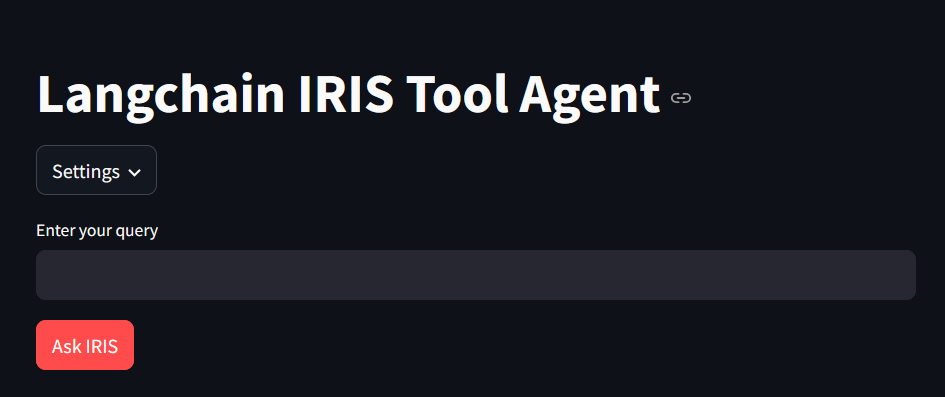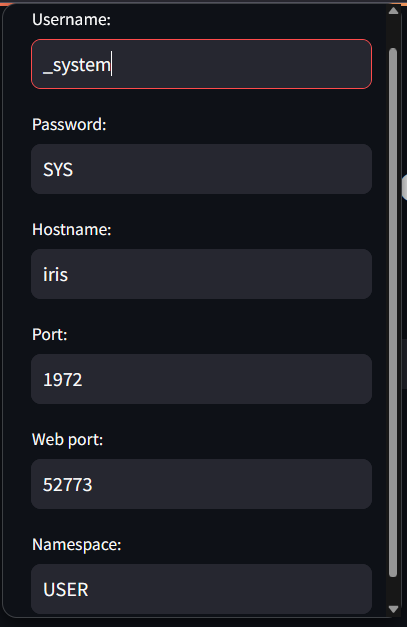Ask your IRIS server using an AI Chat
Now it is possible ask your IRIS server using an AI Chat or compose other agent applications to get:
- List the server metrics
- Return intersystems iris server information
- Save the global value Hello to the global name Greetings
- Get the global value Greetings
- Kill the global Greetings
- List the classes on IRIS Server
- Where is intersystems iris installed?
- Return namespace information from the USER
- List the CSP Applications
- List the server files on namespace USER
- List the jobs on namespace %SYS
To do it, get and install the new package langchain-iris-tool (https://openexchange.intersystems.com/package/langchain-iris-tool).
Installation:
$ git clone https://github.com/yurimarx/langchain-iris-tool.git
$ docker-compose build
$ docker-compose up -dUsing:
1. Open the URL http://localhost:8501
2. Check out the Settings button used to the Agent connect the InterSystems IRIS:

3. Ask one of the following questions and wait some seconds to see the results:
- List the server metrics
- Return intersystems iris server information
- Save the global value Hello to the global name Greetings
- Get the global value Greetings
- Kill the global Greetings
- List the classes on IRIS Server
- Where is intersystems iris installed?
- Return namespace information from the USER
- List the CSP Applications
- List the server files on namespace USER
- List the jobs on namespace %SYS
See the results:

Solutions used:
- Ollama - private LLM and NLP Chat tool
- Lanchain - plataform to build AI agents
- Streamlit - Frontend framework
- InterSystems IRIS as a server to answer the questions about it
About Ollama
It is a free and on-premises LLM solution to be able running Generative AI with privacy and security because your data will be processed on-premises only. The project Ollama supports many models including mistral, Open AI models, Deepseek models and others running on-premises. This package used Ollama via docker compose with the model mistral:
ollama: image:ollama/ollama:latest deploy: resources: reservations: devices: - driver:nvidia capabilities:["gpu"] count:all# Adjust count for the number of GPUs you want to use ports: -11434:11434 volumes: -./model_files:/model_files -.:/code -./ollama:/root/.ollama container_name:ollama_iris pull_policy:always tty:true entrypoint:["/bin/sh","/model_files/run_ollama.sh"]# Loading the finetuned Mistral with the GGUF file restart:always environment: -OLLAMA_KEEP_ALIVE=24h -OLLAMA_HOST=0.0.0.0About Langchain:
Langchain it is a framework to build GenAI applications easily. The Langchain has the concept of tool. Tools are plug-ins (RAG applications) used by Langchain to complement the work of the LLMs. This application implemented a langchain tool to ask management and development questions for your IRIS server:
"""InterSystems IRIS tools for interacting with InterSystems IRIS."""from typing import Any, Dict, List, Optional, Type, Union, cast
from langchain_core.callbacks import CallbackManagerForToolRun
from langchain_core.runnables import RunnableConfig
from langchain_core.tools import BaseTool
from langchain_core.tools.base import ToolCall
from pydantic import BaseModel, Field, PrivateAttr
import requests
import yaml
import iris
import urllib.parse
classInterSystemsIRISInput(BaseModel):"""Input schema for InterSystems IRIS operations."""
operation: str = Field(
...,
description=(
"The operation to perform: 'set_global' (Set Global value), 'get_global' ""(get global value), 'kill_global (delete global)', 'list_objects' (get available objects), 'describe' ""(get object documentation), 'query' (sql query), install_path (get Intersystems IRIS installation path), ""class_list (get Intersystems IRIS class list), server_info (get InterSystems IRIS server information), ""list_csp (list web/csp applications), list_files (list server/intersystems iris files), ""list_metrics(List server/intersystems iris monitoring/metrics), ""get_namespace (get information about a namespace), list_jobs (list the jobs on server/intersystems iris namespace)""'create', 'update', or 'delete'"
),
)
global_name: Optional[str] = Field(
None,
description="The InterSystems IRIS global name for the operations get_global and set_global (e.g., 'Contact', 'Account', 'Lead')",
),
global_value: Optional[str] = Field(
None, description="InterSystems IRIS global value for set_global operation"
),
query: Optional[str] = Field(
None, description="The SQL query string for 'query' operation"
),
filename: Optional[str] = Field(
None,
description="The InterSystems IRIS file name (e.g., 'Contact', 'Account', 'Lead')",
),
class_name: Optional[str] = Field(
None,
description="The InterSystems IRIS class name (e.g., 'Contact', 'Account', 'Lead')",
),
record_data: Optional[Dict[str, Any]] = Field(
None, description="Data for create/update operations as key-value pairs"
)
record_id: Optional[str] = Field(
None, description="InterSystems IRIS record ID for update/delete operations"
)
classInterSystemsIRISTool(BaseTool):"""Tool for interacting with InterSystems IRIS using intersystems-irispython.
Setup:
Install required packages and set environment variables:
.. code-block:: bash
pip install intersystems-irispython
export IRIS_USERNAME="your-username"
export IRIS_PASSWORD="your-password"
export IRIS_NAMESPACE="your-namespace"
export IRIS_PORT="iris-port"
export IRIS_WEBPORT="iris-webport"
export IRIS_HOST="iris-host"
Examples:
Set/Save the value Hello to the global/object greeting:
{
"operation": "set_global",
"global_value": "Hello",
"global_name": "greeting"
}
Get the global value greeting:
{
"operation": "get_global",
"global_name": "greeting"
}
Kill/Delete the global greeting:
{
"operation": "kill_global",
"global_name": "greeting"
}
Describe the class Account:
{
"operation": "describe",
"class_name": "Account"
}
List server/intersystems iris monitoring/metrics:
{
"operation": "list_metrics"
}
List server/intersystems iris files on namespace USER with file name Portal:
{
"operation": "list_files",
"namespace": "USER",
"filename": "Portal"
}
Where is intersystems iris installed?:
{
"operation": "install_path"
}
Return namespace information from the USER:
{
"operation": "get_namespace",
"namespace": "USER"
}
Return information about intersystems iris server:
{
"operation": "server_info"
}
List the jobs on namespace USER:
{
"operation": "list_jobs"
"query": "USER"
}
List the CSP/Web Applications on namespace USER:
{
"operation": "list_csp"
"query": "USER"
}
Query contacts:
{
"operation": "query",
"query": "SELECT TOP 5 Id, Name, Email FROM Contact"
}
Create new contact:
{
"operation": "create",
"object_name": "Contact",
"record_data": {"LastName": "Smith", "Email": "smith@example.com"}
}
"""
name: str = "intersystems_iris"
description: str = (
"Tool for interacting with InterSystems IRIS"
)
args_schema: Type[BaseModel] = InterSystemsIRISInput
_iris: iris.IRIS = PrivateAttr()
_conn: iris.IRISConnection = PrivateAttr()
_username: str = PrivateAttr()
_password: str = PrivateAttr()
_namespace: str = PrivateAttr()
_host: str = PrivateAttr()
_port: int = PrivateAttr()
_webport: int = PrivateAttr()
def__init__(
self,
username: str,
password: str,
hostname: str,
port: int,
webport: int,
namespace: str,
) -> None:"""Initialize iris connection."""
super().__init__()
self._conn = iris.connect(hostname + ":" + str(port) + "/" + namespace, username=username, password=password, sharedmemory=False)
self._iris = iris.createIRIS(self._conn)
self._username = username
self._password = password
self._namespace = namespace
self._host = hostname
self._port = port
self._webport = webport
def_run(
self,
operation: str,
global_name: Optional[str] = None,
global_value: Optional[Any] = None,
query: Optional[str] = None,
filename: Optional[str] = None,
class_name: Optional[str] = None,
namespace: Optional[str] = "%SYS",
record_data: Optional[Dict[str, Any]] = None,
record_id: Optional[str] = None,
run_manager: Optional[CallbackManagerForToolRun] = None,
) -> Union[str, Dict[str, Any], List[Dict[str, Any]]]:"""Execute InterSystems IRIS operation."""try:
baseurl = "http://" + self._host + ":" + str(self._webport)
if operation == "get_global":
ifnot global_name:
raise ValueError("Global name is required for 'get_global' operation")
return self._iris.get(global_name)
elif operation == "set_global":
ifnot global_name:
raise ValueError("Global name and global value are required for 'set_global' operation")
return self._iris.set(global_value, global_name)
elif operation == "kill_global":
ifnot global_name:
raise ValueError("Global name is required for 'kill_global' operation")
return self._iris.kill(global_name)
elif operation == "query":
ifnot query:
raise ValueError("Query string is required for 'query' operation")
cursor = self._conn.cursor()
cursor.execute(query)
return cursor.fetchall()
elif operation == "install_path":
return self._iris.classMethodString('%SYSTEM.Util', 'InstallDirectory')
elif operation == "get_namespace":
if global_name:
namespace = global_name
return self.getStudioApiResponse(baseurl, '/api/atelier/v1/' + urllib.parse.quote(namespace), self._username, self._password)
elif operation == "list_metrics":
return self.getStudioApiResponse(baseurl, '/api/monitor/metrics', self._username, self._password)
elif operation == "list_jobs":
return self.getStudioApiResponse(baseurl, '/api/atelier/v1/' + urllib.parse.quote(namespace) +'/jobs', self._username, self._password)
elif operation == "list_files":
if filename:
print("lista arquivos " + filename + " no namespace " + namespace)
return self.getStudioApiResponse(baseurl, '/api/atelier/v1/' + urllib.parse.quote(namespace) +'/docnames/CLS?filter=' + filename, self._username, self._password)
else:
return self.getStudioApiResponse(baseurl, '/api/atelier/v1/' + urllib.parse.quote(namespace) +'/docnames/CLS', self._username, self._password)
elif operation == "server_info":
return self.getStudioApiResponse(baseurl, '/api/atelier/', self._username, self._password)
elif operation == "list_csp":
return self.getStudioApiResponse(baseurl, '/api/atelier/v1/' + urllib.parse.quote(namespace) +'/cspapps', self._username, self._password)
elif operation == "describe":
ifnot class_name:
raise ValueError("Class name is required for 'describe' operation")
return self._iris.classMethodVoid(class_name, '%ClassName')
else:
raise ValueError(f"Unsupported operation: {operation}")
except Exception as e:
returnf"Error performing Intersystems IRIS operation: {str(e)}"asyncdef_arun(
self,
operation: str,
global_name: Optional[str] = None,
global_value: Optional[str] = None,
query: Optional[str] = None,
filename: Optional[str] = None,
class_name: Optional[str] = None,
namespace: Optional[str] = "%SYS",
record_data: Optional[Dict[str, Any]] = None,
record_id: Optional[str] = None,
run_manager: Optional[CallbackManagerForToolRun] = None,
) -> Union[str, Dict[str, Any], List[Dict[str, Any]]]:"""Async implementation of Intersystems IRIS operations."""# Intersystems IRIS doesn't have native async support,# so we just call the sync versionreturn self._run(
operation, global_name, global_value, query, filename, class_name, namespace, record_data, record_id, run_manager
)
definvoke(
self,
input: Union[str, Dict[str, Any], ToolCall],
config: Optional[RunnableConfig] = None,
**kwargs: Any,
) -> Any:"""Run the tool."""if input isNone:
raise ValueError("Unsupported input type: <class 'NoneType'>")
if isinstance(input, str):
raise ValueError("Input must be a dictionary")
if hasattr(input, "args") and hasattr(input, "id") and hasattr(input, "name"):
input_dict = cast(Dict[str, Any], input.args)
else:
input_dict = cast(Dict[str, Any], input)
ifnot isinstance(input_dict, dict):
raise ValueError(f"Unsupported input type: {type(input)}")
if"operation"notin input_dict:
raise ValueError("Input must be a dictionary with an 'operation' key")
return self._run(**input_dict)
asyncdefainvoke(
self,
input: Union[str, Dict[str, Any], ToolCall],
config: Optional[RunnableConfig] = None,
**kwargs: Any,
) -> Any:"""Run the tool asynchronously."""if input isNone:
raise ValueError("Unsupported input type: <class 'NoneType'>")
if isinstance(input, str):
raise ValueError("Input must be a dictionary")
if hasattr(input, "args") and hasattr(input, "id") and hasattr(input, "name"):
input_dict = cast(Dict[str, Any], input.args)
else:
input_dict = cast(Dict[str, Any], input)
ifnot isinstance(input_dict, dict):
raise ValueError(f"Unsupported input type: {type(input)}")
if"operation"notin input_dict:
raise ValueError("Input must be a dictionary with an 'operation' key")
returnawait self._arun(**input_dict)
@staticmethoddefgetStudioApiResponse(baseurl, path, username, password):
credentials = (username, password)
response = requests.get(baseurl + path, auth=credentials)
status = response.status_code
if status == 200:
if"monitor/metrics"notin path:
return yaml.dump(response.json())
else:
return response.text
else:
returnNoneAbout Streamlit:
The streamlit solution it is used to develop frontends using python language. This application has a streamlit chat application to interact with the Ollama, Langchain and IRIS and get relevant responses:
from langchain_iris_tool.tools import InterSystemsIRISTool
from langchain_ollama import ChatOllama
import streamlit as st
## LANGCHAIN OLLAMA WRAPPER#
username = "_system"
password = "SYS"
hostname = "iris"
port = 1972
webport = 52773
namespace = "USER"## STREAMLIT APP#
st.title("Langchain IRIS Tool Agent")
with st.popover("Settings"):
username = st.text_input("Username:", username)
password = st.text_input("Password:", password)
hostname = st.text_input("Hostname:", hostname)
port = int(st.text_input("Port:", port))
webport = int(st.text_input("Web port:", webport))
namespace = st.text_input("Namespace:", namespace)
# User query input
query = st.text_input(label="Enter your query")
# Submit buttonif st.button(label="Ask IRIS", type="primary"):
tool = InterSystemsIRISTool(
username=username, password=password, hostname=hostname,
port=port, webport=webport, namespace=namespace)
llm = ChatOllama(
base_url="http://ollama:11434",
model="mistral",
temperature=0,
).bind_tools([tool])
with st.container(border=True):
with st.spinner(text="Generating response"):
# Get response from llm
response = llm.invoke(query)
st.code(tool.invoke(response.tool_calls[0]["args"]), language="yaml")Enjoy the app!